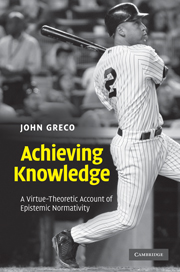6 - The value of knowledge
Published online by Cambridge University Press: 05 June 2012
Summary
In Plato's Meno, Socrates raises a question about the value of knowledge. Why is knowledge valuable? Or perhaps better, What is it that makes knowledge valuable? Jonathan Kvanvig argues that this question is as important to epistemology as Socrates' question about the nature of knowledge, or what knowledge is. Any adequate epistemology must answer both the nature question and the value question. In fact, Kvanvig argues, the two questions interact: If a theory of knowledge does a poor job answering the value question, then that counts against its answer to the nature question. Likewise, if a theory does a good job explaining the value of knowledge, that counts in favor of its answer to the nature question. This seems exactly right. Put another way, the value question is at the heart of the project of explanation. The task of explaining what knowledge is involves the task of explaining why knowledge is valuable.
Before looking more closely at Plato's question in the Meno, however, we should distinguish it from a different question that we have already answered: Why is the concept of knowledge valuable? Our answer to that question was that the concept plays valuable roles in the lives of information-using, information-sharing beings such as ourselves. The human form of life demands good information and the reliable flow of that information. The concept of knowledge, along with related concepts, serves those needs. That is not yet to say, however, why knowledge is valuable.
- Type
- Chapter
- Information
- Achieving KnowledgeA Virtue-Theoretic Account of Epistemic Normativity, pp. 91 - 101Publisher: Cambridge University PressPrint publication year: 2010
- 3
- Cited by



